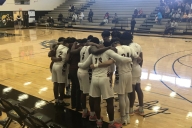You have /5 articles left.
Sign up for a free account or log in.

Joe Robbins/Contributor/Getty Images
Leaders of the National Collegiate Athletic Association are throwing their economic weight and influence behind transgender athletes ability to participate in college sports by threatening to pull lucrative championship events from states with discriminatory laws.
The NCAA Board of Governors released a statement Monday reiterating that it will select championship sites that are “safe, healthy and free of discrimination,” following the passage of four laws, and dozens more bills under consideration, that bar transgender women from competing against cisgender women in K-12 and intercollegiate sports. The board’s statement echoed a position and policy created nearly five years ago, when the association moved championship events from North Carolina after state lawmakers approved legislation that barred transgender people from using public bathrooms associated with the gender with which they identify.
“The NCAA Board of Governors firmly and unequivocally supports the opportunity for transgender student-athletes to compete in college sports,” the statement said. “Our clear expectation as the association’s top governing body is that all student-athletes will be treated with dignity and respect. We are committed to ensuring that NCAA championships are open for all who earn the right to compete in them.”
The board warned that it “will continue to closely monitor these situations to determine whether NCAA championships can be conducted in ways that are welcoming and respectful of all participants.”
The board’s statement was cheered by advocates for LGBTQ inclusion in college athletics, who last month urged the association to take a definitive stance against policies in several states that attempt to restrict transgender people's participation in sports. Chase Strangio, deputy director for trans justice for the American Civil Liberties Union, said in a statement that the championship policy could have drastic economic impacts on states that discriminate against transgender athletes. The ACLU is representing a transgender woman who is a prospective Boise State University track athlete who is suing over Idaho’s 2020 law banning transgender women from NCAA women’s sports.
“State lawmakers around the country should pay attention: discriminating against transgender students is wrong, against the law, and costly,” Strangio said. “If you continue to pass these misguided laws state taxpayers risk not only costly litigation but the loss of revenue from these tournaments.”
The NCAA's statement even elicited praise from thought leaders, who have lately railed against the NCAA on other issues such as athlete compensation and gender disparities exposed during the Division I basketball tournaments. Donna Lopiano, a national expert on gender equity in sport and president of the Drake Group, an organization that advocates for college sports reform, applauded the NCAA Board of Governors for its stance on the state legislation.
“I don’t get the chance to applaud them often, especially in the last couple weeks,” Lopiano said. “There’s no question that at the state level in particular, economics makes a difference. If that’s what it takes for people to have a good conversation about this and come to a solution about this issue, that’s all good.”
Ellen Staurowsky, a sports media professor at Ithaca College and national expert on social justice in sport, said the NCAA’s threat of pulling championships has had real impact on policy decisions by state lawmakers. Staurowsky noted that a slight change last year to the NCAA’s Confederate flag policy, which said that championships would not be played “in states where the symbol has a prominent presence,” effectively pressured Mississippi legislators and Governor Tate Reeves to remove the Confederate battle emblem from the state’s flag.
“The NCAA has long had considerable power of persuasion when it comes to influencing state lawmakers,” Staurowsky said. “These laws will affect every single school in the association and every single athlete in the association. Access is everyone’s business, regardless of whether you’re personally impacted by a piece of legislation.”
Staurowsky said the final four games of the NCAA Division I men’s basketball tournament can bring in between $250 and $300 million for a host city in a good year. A city hosting the women’s tournament can reap between $100 and $125 million, and other sports championships -- there are about 90 events total -- can have “significant economic impact,” she said.
Reeves's resolve will be tested again after he signed legislation last month banning transgender women from participating in women’s sports in Mississippi. Tennessee and Arkansas passed similar laws, and a bill in West Virginia is awaiting the signature of Governor Jim Justice, who said during a recent press conference that he would either sign it or “let it go into law.”
During the press conference, which was broadcast by WOWK-TV, a CBS affiliate in West Virginia, Justice expressed support for the bill’s enforced exclusion of transgender girls from girls’ sports at the K-12 level, but he balked at applying the rule to college sports, citing concerns about future opportunities to host NCAA championships.
“It concerns me that we may miss out on a really important sporting event that could come to West Virginia,” Justice said. “However, I think the benefits of it outweigh the bad part of it.”
Anne Lieberman, director of policy and programs at Athlete Ally, a national organization that advocates for LGBTQ inclusion and equality in sports, said the NCAA Board of Governors could have been more direct in their statement. Lieberman, who is nonbinary and uses the pronouns "they" and "them," said the association should have made clear that it won’t be hosting championships in states with policies that exclude transgender athletes from sports, whether they are at the K-12 or college level.
“They could halt these bills, easily, if they said these championships weren’t coming,” Lieberman said.
Staurowsky and Lieberman condemned several state lawmakers for "weaponizing" the fight for women’s equity in sport against transgender inclusion. State lawmakers have characterized the bills as protecting women's sports from male-to-female transgender athletes, who, lawmakers argue, have physical advantages over cisgender female athletes and would take opportunities to compete away from them.
The laws restricting transgender participation in women’s sports in Idaho and Arkansas, for example, are called the Fairness In Women's Sports Act. Lieberman called this a “red herring” and “false choice” that pit improvements to and equality in women’s sports against the LGBTQ community.
Staurowsky said the “language is deeply troubling” and noted that women being excluded from sports due to transgender participation has not been a prominent issue in states where lawmakers are pushing for restrictive legislation.
“In many of these states that have proposed bills, there isn’t even one case in the state where this issue has come up,” she said. “These bills are being built on a false narrative. Nothing good ever comes from manufacturing an excuse to bar people from their humanity and from the very essence of who they are.”








